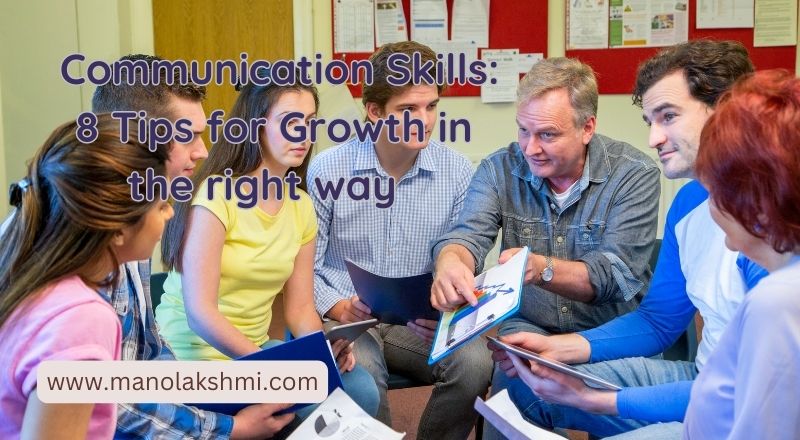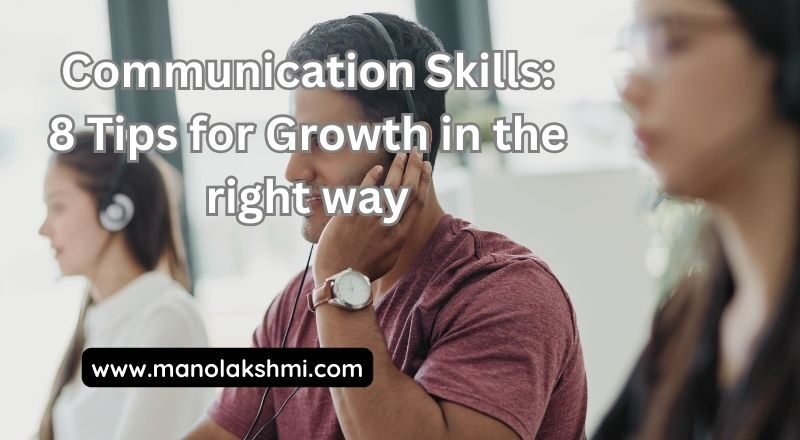What is Communication?
Communication skills are the act of trading information, ideas, and beliefs. Between individuals or groups. Effective communication is essential in both personal and professional settings. It involves the use of verbal and nonverbal cues. To convey a message accurately and efficiently.
Good communication skills can help build strong relationships, resolve conflicts, and increase productivity. Some ways to improve touch skills include active listening. Being clear and concise, using proper body language. And taking the time to understand the other person’s perspective.
Communication skills:
A useful message is a crucial skill that can help you grow in both your secret and adept life. Here are some vital aspects of transmission talents that you may want to consider.
 Listening: Active listening is an essential component of communication. It involves truly hearing. What the other person is saying without interrupting or judging them. When you listen actively, you can better understand. The other person’s point of view and respond appropriately.
Listening: Active listening is an essential component of communication. It involves truly hearing. What the other person is saying without interrupting or judging them. When you listen actively, you can better understand. The other person’s point of view and respond appropriately.
Nonverbal communication: Body language, facial expressions, and tone of voice. can all convey meaning in a conversation?
Being aware of your nonverbal cues and interpreting those of others can help you Communicate more actually.
Clarity: Clear communication is essential for avoiding misunderstandings. Be brief and specific in your messages. And make sure you are using language that the other person can understand.
Confidence: Confidence in your communication skills. can help you convey your ideas and opinions with authority. Practice speaking in front of others, and work on projecting confidence. Through your tone and body language.
By honing your communication skills, you can build stronger relationships. Resolve conflicts more effectively, and achieve your goals more easily.
Effective communication is a crucial part of personal and professional growth. Improving your communication skills can lead to better relationships. Increased productivity, and even career advancement.
Here are some tips to help you grow your communication skills in the right way:
Listen actively:
Pay attention to what the other person is saying, and reply properly. Here are some additional tips to help you become a better listener:
 Avoid interrupting the other person while they are speaking. Allow them to finish their thoughts before responding.
Avoid interrupting the other person while they are speaking. Allow them to finish their thoughts before responding.
Use body language to show that you are engaged in the conversation. Make eye contact, nod your head, and lean in slightly to show that you are listening attentively.
Paraphrase what the other person has said to ensure that you have understood their message correctly. For example, you could say “So what you’re saying is…” or “If I understand you correctly, you are saying that…”
Ask open-ended questions to encourage the other person to share more information with you. For example, you could ask “Can you tell me more about that?” or “How do you feel about this situation?”
Avoid jumping to conclusions or making assumptions about what the other person is saying. Instead, ask for clarification if you are unsure about something they have said.
Be clear and concise:
Evade using jargon or complicated language, and get directly to the point.
When communicating with others, it is important to keep in mind that not everyone may be familiar with the same jargon or technical terms that you are. By keeping your language simple and to the point, you can ensure that your message is understood by a wider audience.
Here are some tips to help you be clear and concise in your communication:
Use simple words and phrases: Instead of using complex vocabulary, try to use words that are easy to understand. This can help prevent confusion and ensure that your message is clear.
Get to the point: Avoid beating around the bush and get straight to the heart of the matter. This can help keep your message focused and prevent your audience from losing interest.
Use examples: Sometimes, it can be helpful to use examples to illustrate your point. This can make your message more relatable and easier to understand.
Check for understanding: After you have communicated your message, it is important to check that your audience has understood what you are trying to say. This can help prevent misunderstandings and ensure that your message has been received as intended.
Practice empathy:
Put yourself in the other someone’s shoes, and try to comprehend their perspective.
Here are some reasons why practicing empathy is important and can benefit you and those around you:
It helps build stronger relationships: When you make an effort to understand someone else’s perspective, you create a deeper connection with them. This can lead to more meaningful relationships, whether it’s with friends, family, or coworkers.
It promotes better communication: Empathy helps you communicate more effectively by allowing you to see things from the other person’s point of view.
This can help you avoid misunderstandings, resolve conflicts, and build trust.
It increases your emotional intelligence: By being more aware of your own emotions and those of others, you become more emotionally intelligent. This can help you navigate social situations more effectively and make better decisions.
Overall, practicing empathy can help you become a more compassionate and understanding person, which can benefit both you and those around you.
Use nonverbal cues:
Your body language can convey just as much as your words, so be aware of your posture, eye contact, and facial expressions. Here are some ways to effectively use nonverbal cues to enhance your communication:
Stand or sit up straight with your shoulders relaxed to convey confidence and attentiveness.
Maintain eye contact to show that you are engaged and interested in the conversation.
Use appropriate facial expressions to convey your emotions and reactions to what is being said.
Avoid crossing your palms or legs, as this may make you seem protected or closed off.
Use hand gestures sparingly and purposefully to emphasize your points and add emphasis to your message.
By paying attention to your nonverbal cues, you can enhance your communication and ensure that your message is being received as intended.
Avoid interrupting:
Wait until the other person is finished speaking before responding.
Interrupting someone while they are speaking can be seen as disrespectful and can hinder effective communication. Waiting until the other person is finished speaking before responding can show that you are actively listening and valuing their thoughts and opinions. Here are some additional tips to avoid interrupting:
Use active listening skills such as nodding and providing verbal cues to show that you are engaged in the conversation.
Take notes if necessary to help you remember your thoughts or questions until it is your turn to speak.
If you feel the need to interject, politely ask for permission to speak or wait for a pause in the conversation before adding your input.
By being mindful of the other person’s speaking time and practicing good communication habits, you can create a positive and respectful conversation environment.
Ask questions: Communication
Clarify any confusion by asking questions and seeking more information. Asking questions is a valuable skill. That can help you gain a deeper understanding of a topic or situation.
Here are some tips on how to ask effective questions:
 Start with open-ended questions: Instead of asking yes or no questions. try to ask open-ended questions that encourage the person to provide more. For example, in preference to asking “Did you want the presentation?
Start with open-ended questions: Instead of asking yes or no questions. try to ask open-ended questions that encourage the person to provide more. For example, in preference to asking “Did you want the presentation?
Listen actively: When asking questions, make sure to listen actively. to the person’s response. This means paying attention to their words, tone, and body language.
Avoid leading questions: Be careful not to ask leading questions. That suggests a particular answer. For example, in place of asking “Don’t you observe the challenge changed into a failure?
Remember, asking questions is a sign of curiosity and a desire to learn. So don’t be afraid to ask questions and seek more information.
Practice active speaking:
Communication Speak clearly and with confidence, and avoid filler words like “um” and “uh.”
To further improve your speaking skills, it’s important to practice speaking actively.
Here are a few pieces of advice that will help you do simply that:
Find a speaking partner or group to practice with. This could be a friend, family member, or even a public speaking club.
Record yourself talking and concentrate on returning to it. This can help you identify areas where you need to improve. such as speaking too quickly or not enunciating clearly.
Practice speaking in different settings and scenarios. For example, you could practice giving a presentation. having a conversation with a stranger, or ordering food at a restaurant
Use visualization techniques to help you feel more confident. Imagine yourself speaking confidently and clearly, and visualize a positive outcome.
By practicing these techniques and focusing on speaking actively. you can improve your speaking skills and become a more effective communicator. So go ahead and start practicing today!
Reflect on feedback: Communication
Always seek feedback from others and reflect on it. how you can improve your communication skills.
Continuing to seek feedback and reflect on your communication skills. can greatly benefit your personal and professional relationships. Here are some tips for effectively receiving and utilizing feedback:
Listen actively: When a person is giving you feedback. fully listen to what they have to say without interrupting or becoming defensive. This will help you understand their perspective and identify areas for improvement.
Ask clarifying questions: If there is something you don’t understand about the feedback. ask questions to gain clarity. This also shows that you are taking the feedback. Seriously and are intended to improve.
Take action: After reflecting on the feedback. develop an action plan for how you can improve your communication skills. This could include practicing active listening. communicating more clearly, or using nonverbal cues effectively.
Remember, receiving feedback can be uncomfortable. But it is an important step in growing and growing as a communicator.
By implementing these tips, you can improve your communication skills and enhance your personal and professional growth.
Visit and support our page: Beaches: The Seven Best Beaches in Massachusetts

Лучшие цены на автоэлектронику в ParkCam — камеры заднего вида, видеорегистраторы и многое другое
интернет магазин автоэлектроники parkcam ru
Элегантные кувшины для сервировки — сделайте свою кухню стильной
графин для воды стеклянный с крышкой купить http://www.elitenposuda.ru .